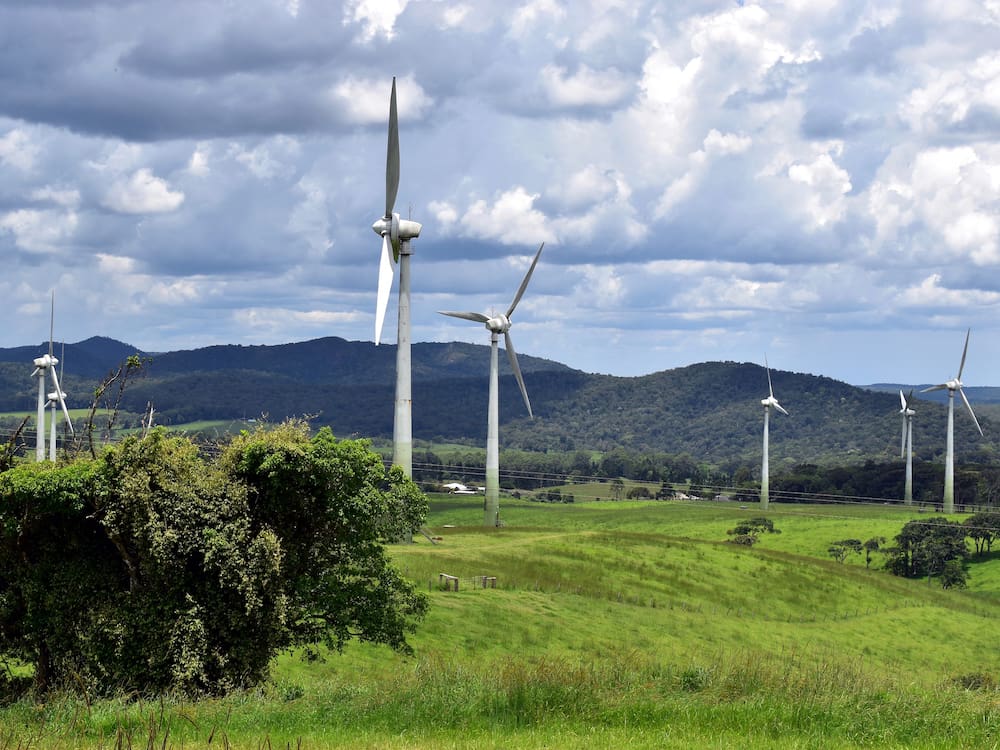
A section of a wind farm showing seven wind turbines in the Atherton Tablelands in Tropical North Queensland Australia
AGFORCE says it is is increasingly concerned that delays to urgently needed reforms to the Wind Farm Code could put agricultural landholders at potentially crippling financial risk.
Despite a review of the Wind Farm Code last year, it was disappointing that the Queensland Government has not released any reforms to the Code since, AgForce said in a media statement issued this week.
The Queensland producer representative body is now urging any primary producers considering hosting wind turbines on their property to take extra precautions.
CEO Michael Guerin says it’s vital that landholders not jeopardise the future of their farms by being too hasty to develop before proper policy protections are in place.
“AgForce recommends that any landholder considering hosting wind turbines insist on a bank guarantee from the wind farm company to cover the cost of decommissioning the wind farm,” Mr Guerin says.
“This covers you in case the wind farm company fails to perform the decommissioning themselves.
“It’s also the advice from the Australian Energy Infrastructure Commissioner.”
Mr Guerin says that proper security in the form of a bank guarantee must be sought by landholders before any development takes place, to ensure they are not potentially burdened with the huge costs associated with decommissioning the wind farm.
“Through necessity this system of security was developed in the resource industry to ensure that huge rehabilitation costs were not worn by the taxpayer,” he says.
“We are increasingly concerned that the Queensland Government has not addressed this in the same way that it brought in legislation for the resource industry to ensure bank guarantees cover decommissioning as part of the approvals process.”
AgForce is aware that the Queensland Government is currently reviewing the Wind Farm Code, and was expecting a revised Code would be released in early 2024.
“But we are now in July and there is no revised Code,” Mr Guerin says.
“AgForce made a detailed submission to the Queensland Government regarding the review and would welcome the opportunity to have further input.
“It is very concerning to us that the Queensland Government has not resolved this issue, whilst at the same time landholders are being encouraged by wind farm companies to sign agreements without proper security in the form of a bank guarantee.
“We do not consider promises to pay into funds at some future date as constituting proper security.”
He says the policy reforms are particularly needed to safeguard against statements such as those made recently by former corporate adviser on Low Emissions Technology and former National Chief Scientist Dr Alan Finkel that approvals processes for renewable energy projects are taking too long (ABC’s Southern Queensland and Capricornia Rural Report, 16 July).
Dr Finkel told the ABC that this gave other countries a competitive advantage to meet their global emissions reduction targets, and that Australia should follow Europe’s example by requiring that a project is either approved or denied within 12 months and that regulators and the courts must take into account the overriding public interest in making the decision.
AgForce has serious concerns with the ideology that it doesn’t matter if local biodiversity is impacted if the overriding public interest is served to reduce global warming and global biodiversity damage.
Such statements completely ignore the rights of landholder who will be hosting these renewable energy projects and reinforces the idea for city voters that destroying farmland is for the greater good,” Mr Guerin says.
Source: AgForce

Applause to Agforce for these statements, particularly: “AgForce has serious concerns with the ideology that it doesn’t matter if local biodiversity is impacted if the overriding public interest is served to reduce global warming and global biodiversity damage.
Such statements completely ignore the rights of landholder who will be hosting these renewable energy projects and reinforces the idea for city voters that destroying farmland is for the greater good,” Mr Guerin says.
Good on Agforce for highlighting these deficiencies in the system about decommissioning and decrease in land value – additional problems are getting insurance and direct effects on neighbours. Dr Finkel and the ABC have no credibility left, and do not seem to be aware that not one climate catastrophe or climate boiling prediction has come to fruition. The Maldives are still above water and the poles have not melted. The list of debunks are long, and Flannery et al have been 100% wrong. The whole thing is crisis capitalism, at our childrens expense.
The legislation in NSW is just as lame. There is no legal requirement for the developer to be in a sound fiscal condition to pay for rehabilitation at projects end. The legislation says that they “SHOULD” do so not MUST. All the responsibility lies with the landholders ability to sign an agreement that safeguards their position. As it stands now one company develops the site and leases to another who receives most of the revenues including Tax payer funded subsidies. This situation is best shown in Tasmania where 2 large wind farms , Woolnorth & Musselroe bay are leased to the Chinese Govt via its 100% owned subsidiary Shenhua. One might question if at projects end the original company has insufficient funds to rehabilitate the site then this task might be left to the landholder. At the moment we have investment funds scouring the globe searching for Govt subsidies & when those subsidies dry up I doubt the will hang around to clean up the mess. A mining company or gas company must pay a bond to the Govt that guarentees the rehabilitation of their sites whereas renewable energy projects do not … they simply SHOULD…. yep that should work. Remember that as good a deal you as a landholder signs with the developer when the whole show shuts down and that company is a cashless shell you will be left with the mess.